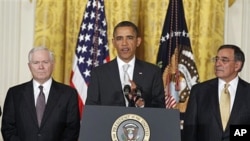President Barack Obama on Thursday formally announced leadership changes for the Department of Defense, CIA, and command of U.S. military operations in Afghanistan. Mr. Obama said the choices will help the United States confront ongoing challenges to its security.
In moving CIA chief Leon Panetta to the Pentagon by July, and switching Afghanistan commander Army General David Petraeus to the CIA, President Obama says he is confident they will bring continuity and efficient management to major military objectives.
Related video report by Carolyn Presutti
These include the war in Afghanistan and what Obama said must be "steadfast" efforts against al-Qaida as well as the process of withdrawing remaining U.S. troops from Iraq by the end of the year.
At the Pentagon, Panetta will have to carry out President Obama's objective of trimming $400 billion in spending from a huge defense budget.
General Petraeus will bring to the CIA counter-terrorism strategies and respect he gained leading operations in Iraq and Afghanistan. He will pass on his command responsibilities for U.S. military forces in Afghanistan to Marine Corps Lieutenant General John Allen.
In the White House East Room, President Obama said he believes he has picked the right team at a challenging time.
"Given the pivotal period that we are entering, I felt it was absolutely critical that we had this team in place so that we can stay focused on our missions, maintain our momentum, and keep our nation secure," said President Obama.
In Afghanistan, General Allen will work with veteran diplomat Ryan Crocker, nominated as the new U.S. ambassador in Kabul, to implement President Obama's and NATO's road map, which involves a U.S. troop drawdown beginning in July and a full transition of security to Afghan government forces by 2014.
President Obama praised outgoing Defense Secretary Robert Gates as someone who helped wind down the war in Iraq while challenging "conventional thinking" about the military.
Gates, the only holdover from the cabinet of former President George W. Bush, outlined what he saw as his main responsibility as defense secretary.
"My highest priority, from my first day in office, has been to do everything I could for our uniformed men and women in harm's way - to help them accomplish their mission, to come home safely and, if wounded, to get them the best possible care from battlefield to home front," said Robert Gates.
Panetta praised the employees of the CIA and their work, and spoke about what he called "a time of historic change" for the United States.
"Today, we are a nation at war and job one will be to ensure that we remain the strongest military power in the world, to protect that security that is so important to this country," said Leon Panetta.
Panetta referred to what he called "a time for hard choices" demanding that "we be strong and disciplined in applying our nation's limited resources," a reference to spending reduction challenges ahead.
President Obama said General Petraeus's knowledge of the Middle East and Afghanistan uniquely qualify him to lead the CIA in its effort to defeat al-Qaida, adding that Petraeus understands the importance of sharing and coordinating information.
General Petraeus praised what he called the "quiet professionals" of the CIA, saying he had seen their expertise, commitment and courage.
Petraeus, who returns to Afghanistan on Friday to prepare the transition to his successor, said he is optimistic that the new national security team will be able to deal with the challenges ahead.
"As I return to Afghanistan tomorrow, I will do so with a sense of guarded optimism about the trajectory of the mission and the exceptional civil-military team the president will nominate to lead that effort," said General Petraeus.
Lieutenant General Allen said he was "mindful" of the significance of the responsibility of leading U.S. military operations in Afghanistan.
Ambassador Crocker spoke about the U.S. mission there:
"The challenges are formidable and the stakes are high," said Ambassador Crocker. "9/11 [the September 2001 terrorist attacks on the United States] came to us out of Afghanistan. Our enemy must never again have that opportunity."
In his remarks, President Obama said the challenges facing his new team include ensuring that the United States stands with people across the Middle East and North Africa who are seeking to determine their own destiny, including continuing support for international military operations to protect the Libyan people.
All of President Obama's selections for the Pentagon, CIA and leadership positions in Afghanistan are subject to confirmation by the U.S. Senate. Already, they have met with wide praise from Democrats and Republicans on Capitol Hill, including key members of the Senate who will be involved in their confirmation hearings.
Obama Announces Cabinet, Afghanistan Changes
- By Dan Robinson





